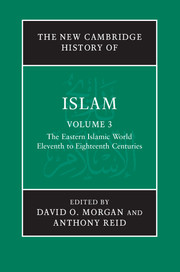Book contents
- Frontmatter
- Introduction: Islam in a plural Asia
- PART I THE IMPACT OF THE STEPPE PEOPLES
- PART II THE GUNPOWDER EMPIRES
- PART III THE MARITIME OECUMENE
- PART IV THEMES
- 15 Conversion to Islam
- 16 Armies and their economic basis in Iran and the surrounding lands, c. 1000–1500
- 17 Commercial structures
- 18 Transmitters of authority and ideas across cultural boundaries, eleventh to eighteenth centuries
- Glossary
- Bibliography
- Index
- References
15 - Conversion to Islam
from PART IV - THEMES
Published online by Cambridge University Press: 28 March 2011
- Frontmatter
- Introduction: Islam in a plural Asia
- PART I THE IMPACT OF THE STEPPE PEOPLES
- PART II THE GUNPOWDER EMPIRES
- PART III THE MARITIME OECUMENE
- PART IV THEMES
- 15 Conversion to Islam
- 16 Armies and their economic basis in Iran and the surrounding lands, c. 1000–1500
- 17 Commercial structures
- 18 Transmitters of authority and ideas across cultural boundaries, eleventh to eighteenth centuries
- Glossary
- Bibliography
- Index
- References
Summary
Introduction
Though it is self-evident that over the centuries many millions of people have changed their religious identity from non-Muslim to Muslim, a majority of them since the turn of the twelfth/sixth century in lands east of Iran, scholars understand the word ‘conversion’ in a variety of ways and use differing approaches in their studies of these changes. One person considers conversion to involve a deeply felt personal change in religious belief; another simply counts the growth over time in the number of people who consider themselves, or are considered by others, to be Muslims and infers that conversion has taken place. One person collects stories or legends about conversion experiences; another analyses social and economic circumstances to explain the growth of the Muslim community. The method chosen sets limits on the conclusions that can be reached. Just as stories about individuals cannot be relied on to explain mass phenomena, economic data and quantitative modelling say nothing about spiritual experience.
Complicating the matter still further, studies of conversion often take it for granted that converts to Islam move from one known entity to another, while in fact both Islam and the religions from which new converts come change over time and in response to their relative position in society. A person who is among the first in a community to convert to Islam is in a very different position from the person who is the last in the community to change religions, and almost certainly acts from a different motivation.
- Type
- Chapter
- Information
- The New Cambridge History of Islam , pp. 527 - 538Publisher: Cambridge University PressPrint publication year: 2010
References
- 1
- Cited by



